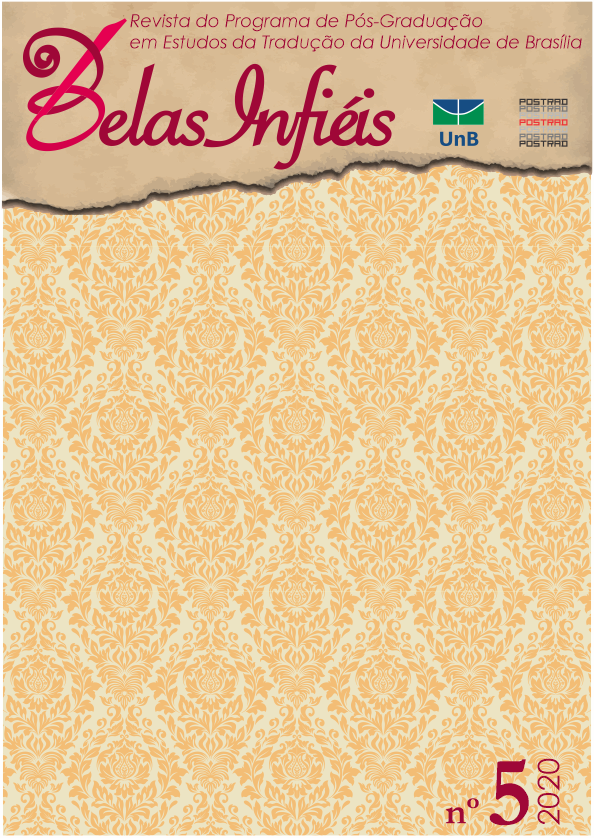A proposal of an ethnographic translation for MALINCHE: Describing Mesoamerican deities
DOI:
https://doi.org/10.26512/belasinfieis.v9.n5.2020.27154Keywords:
MALINCHE. Laura Esquivel. Mesoamerican deities. Ethnographic perspective. Etnographic translation.Abstract
This work consists on commenting the translation-description experience of the deities worshipped by pre-Hispanic peoples of Mesoamerican before the Castilian encroachment in the sixteenth century. The Mesoamerican deities mentioned are present in MALINCHE (2006), a novel by the Mexican writer Laura Esquivel. All the commentaries are founded on the ethnographic and descriptive perspective of François Laplantine, in which the translating task is tackled not as a mechanism of substitutions and correspondences between words, but as an opportune space for a meeting and interaction of cultures and languages. Thus, it was necessary to reflect on the transformations that the translator’s view into himself must undergo for the purpose of not seeing the other as deviation or astonishment. The task requires from the translation of the literary work an intention that is able to look at how pre-Hispanic spiritual values will be shaped in the language of translation in order to situate the “other” belonging to a distinct cultural locus. In this sense, it is proposed to present the description as a valid means of translation since it promotes the mutual looks between different cultures. Descriptive translation becomes the object of observation of observation, showing the limits and also the great extensions that allow a translator to reach in its performative character.
Downloads
References
I. Do artigo
BERMAN, Antoine. A tradução e a letra ou o albergue do longínquo. Traduzido por: Marie-Hélène Catherine Torres, Mauri Furlan, Andréia Guerini. Rio de Janeiro: 7 Letra /PGET, 2007. Tradução de: La traduction et la lettre, ou L’auberge du lointain.
ESQUIVEL, Laura. MALINCHE. São Paulo:Ed. Suma de Letras, 2006.
HERNÁNDEZ GONZÁLEZ, Cristina. Doña Marina (la Malinche) y la formación de la identidad mexicana. Madri: Ed. Encuentro Ediciones, 2002.
LAPLANTINE, François. A descrição etnográfica. Traduzido por: João Manuel Ribeiro Coelho. São Paulo: Terceira Margem, 2004. Tradução de: La description ethnographique.
LEÓN-PORTILLA, Miguel. Códices. Os antigos livros do Novo Mundo. Traduzido por: Carla Carbone. Florianópolis: Ed. da UFSC, 2012. Tradução de: Codices: los Antiguos Libros del Nuevo Mundo.
PAZ, Octavio. El laberinto de la soledad. Fondo de cultura económica: México, 1998.
II. Das descrições etnográficas
FAMSI. Fundación para el Avance de los Estudios Mesoamericanos. Disponível em: http://www.famsi.org/spanish/research/graz/borgia/thumbs_0.html Acesso em:
set. 2020.
FAMSI. Fundación para el Avance de los Estudios Mesoamericanos. Disponível em: http://www.famsi.org/spanish/research/graz/borbonicus/thumbs_0.html Acesso em: 5 set. 2020.
FLORESCANO, Enrique. Los orígenes del poder en Mesoamérica. México: FCE, 2009.
Downloads
Published
How to Cite
Issue
Section
License
Copyright (c) 2020 CC BY

This work is licensed under a Creative Commons Attribution 4.0 International License.
Given the public access to this journal, the texts are free to use but requires the recognition of the original authorship and initial publication in this journal to be properly stated.
 The journal allows the use of works published for non-commercial purposes, including the right to submit the work to publicly accessible databases. Published contributions are the sole and exclusive responsibility of the author(s).Â



















